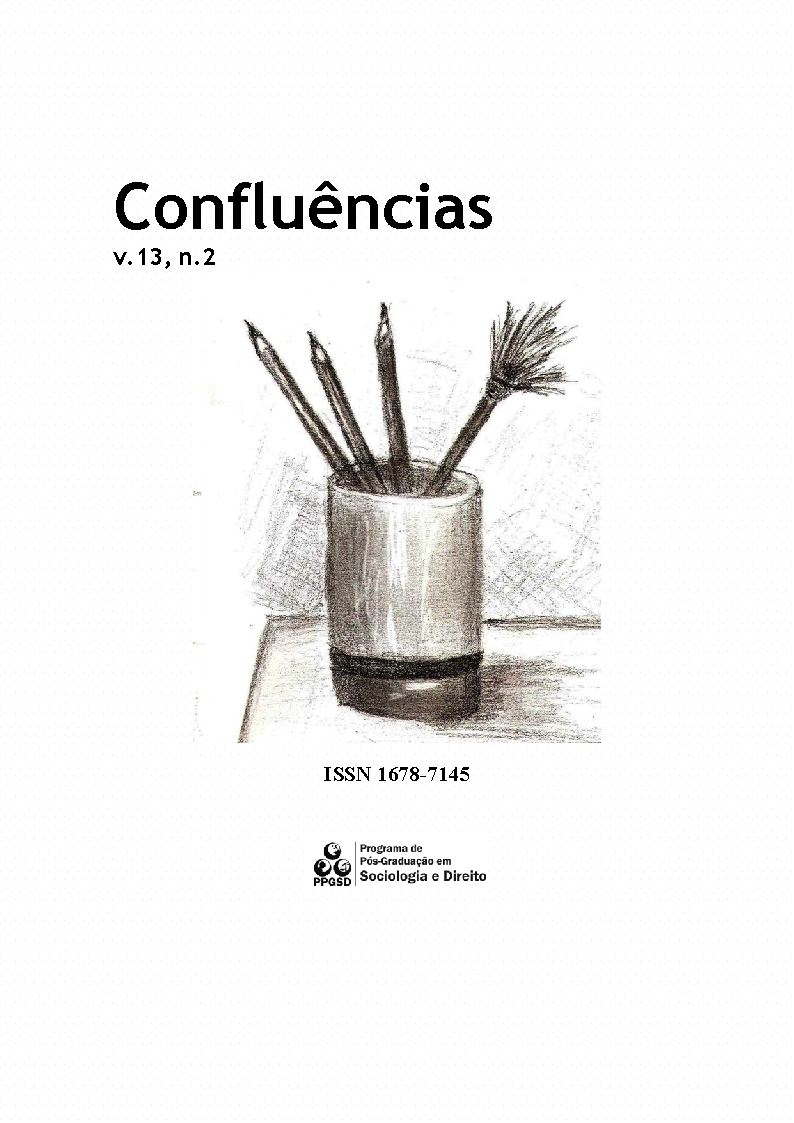A tradição inquisitorial brasileira
DOI :
https://doi.org/10.22409/conflu13i2.p304Mots-clés :
Tradição Inquisitorial, Inquérito Policial, Igualdade JurídicaRésumé
O trabalho aborda o processo histórico que influenciou e influencia o Sistema Processual Penal brasileiro. Vislumbrado sob a ótica do Tribunal da Santa Inquisição, o atual Processo Penal guarda ainda relação direta com procedimentos e fundamentos que aparentemente não estão coadunados com a inteligência de um Estado Democrático de Direito. Através da análise da situação dos judeus na Espanha e em Portugal percebe-se que o processo de transformação social inicia-se remotamente com o surgimento de uma nova classe (novos cristãos), a qual fora constantemente perseguida e destituída de direitos, através de processos que não permitiam o direito de defesa. A Inquisição revelou-se um mecanismo eficaz de controle social e de perpetuação do sistema de exercício do poder. O Estado e a Igreja Católica fizeram uso da Inquisição fundamentando seus atos em princípios como da defesa da fé católica e da vontade divina. A presença do Santo Ofício no Brasil através das “Visitações” e os expedientes utilizados pelo Tribunal de Inquisição degradaram a solidariedade social através da construção de uma reinante insegurança que teve por alicerce o instituto do segredo. O rito processual, a situação do réu e as culpas (crimes) são descritos e analisados sempre tendo por foco o impacto social e a fundamentação aventada pela Igreja. Muitos destes conceitos e ideologias ainda estão presentes em nosso ideário social e no nosso ordenamento jurídico. Confissão, delação premiada, busca da “verdade real” e sigilo do Inquérito Policial são expedientes que nos reportam a lógicas não mais aceitas sob o prisma de uma concepção processual que preceitua o respeito à Dignidade da Pessoa Humana. Porém, a tradição inquisitorial brasileira se revela muito forte e encontra fundamento em uma singular maneira de entender a igualdade jurídica fazendo com que conceitos evidentemente anacrônicos pareçam razoáveis ante a sociedade, aos operadores e aos pensadores do direito.Téléchargements
Références
CAPEZ, Fernando. Curso de direito penal: parte geral. Volume 1. 7ª edição revisada e
atualizada. São Paulo: Saraiva, 2004.
GRECO FILHO, Vicente. Manual de Processo Penal. 3ª edição atualizada. São Paulo:
Saraiva, 1995.
LIMA, Roberto Kant de. Ensaios de Antropologia e de Direito. 2ª edição. Rio de Janeiro:
Lúmen Juris, 2009.
NICOLITT, André Luiz. Manual de Processo Penal. Rio de Janeiro: Elsevier, 2009.
NOVINSK, Anita. Cristãos Novos na Bahia. São Paulo: Perspectiva, 1972.
OLIVEIRA, Eugênio Pacelli de. Curso de Processo Penal. 8ª edição. Rio de Janeiro:
Lumen Júris, 2007.
RANGEL, Paulo. Direito Processual Penal. 12ª edição versão ampliada e atualizada. Rio
de Janeiro: Lumen Júris, 2007.
SILVA, Lina Gorenstein Ferreira da. Heréticos e Impuros: a Inquisição e os Cristãos-
Novos no Rio de Janeiro Século XVIII. Rio de Janeiro: Biblioteca Carioca, 1995.
TOURINHO FILHO, Fernando da Costa. Prática de Processo Penal. 17ª edição atualizada
e ampliada. São Paulo: Saraiva, 1995.
Téléchargements
Publiée
Numéro
Rubrique
Licence
Os autores mantêm os direitos autorais e concedem à revista o direito de primeira publicação, com o trabalho simultaneamente licenciado sob a Licença Creative Commons Attribution que permite o compartilhamento do trabalho com reconhecimento da autoria e publicação inicial nesta revista. Têm autorização para assumir contratos adicionais separadamente, para distribuição não-exclusiva da versão do trabalho publicada nesta revista (ex.: publicar em repositório institucional ou como capítulo de livro), com reconhecimento de autoria e publicação inicial nesta revista. Possuem permissão e são estimulados a publicar e distribuir seu trabalho online (ex.: em repositórios institucionais ou na sua página pessoal) a qualquer ponto antes ou durante o processo editorial, já que isso pode gerar alterações produtivas, bem como aumentar o impacto e a citação do trabalho publicado.







